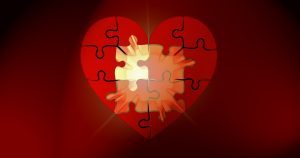 If you are a person who has always jumped from one relationship into another, often with the same type of negative partner, you may be a person that is codependent.
If you are a person who has always jumped from one relationship into another, often with the same type of negative partner, you may be a person that is codependent.
This is a learned behavior, often from childhood, where a person cannot have a healthy giving and taking relationship. Instead, she or he is always the giver in the relationship, sacrificing everything to try to keep the other partner happy. This leaves the love addict or codependent feeling emotionally drained, unsatisfied and ultimately broken when the unhealthy relationship finally fails.
While this may seem like the worst possible outcome, the failure of a relationship is actually a silver lining to what may look like gathering storm clouds in your emotional life. This is a time to take a break, look closely at yourself and start changing those old, inaccurate perceptions about you that are driving this behavior.
The Break Time Benefits
With the help of a therapist, counselor or coach, the break between one negative and destructive relationship and the potential to get into another is the ideal time to work on you.
During this time, the focus should be on:
- Understanding your behaviors – why you look for specific traits and behaviors in partners that turn out to be negative and destructive often goes back to how your parents treated each other and the children in the family. Understanding the roots of the learned behavior can help you to learn new, healthier and more positive options.
- Develop autonomy – being comfortable in being with yourself as a single person not in a relationship is a very big step. Once you can love being with yourself, you can start to have a healthy, loving relationship with someone else.
- Setting boundaries – often people with love addiction cannot set boundaries. They cannot say “no,” and so they are constantly giving away their energy, their emotions and even their sense of self. Learning to set boundaries will be critical to being comfortable as your own person.
By learning to be comfortable with yourself, you can begin to deal with your own needs and your own misconceptions about relationships that have developed from an early age. Often people with love addiction feel unworthy of love as they were never loved and provided with the emotional nurturing of their parents.
As an adult, it is possible to learn how to provide that self-empowerment, self-esteem and self-worth. Becoming confident in who you are as a person will allow you to move forward in finding someone who is able to provide a healthy, give and take relationship.
How long your break from relationships will need to be is really a personal factor. However, it isn’t a few days or even a few weeks, and it will take effort, focus and the willingness to go through some challenges and temptations along the way.
Remember, love addiction isn’t a disease, it is a learned behavior. You have had a lifetime to learn and reinforce this negative behavior, so it will take time to learn new ways to look at yourself, at others, and to understand what you want and deserve in a healthy relationship.
Sherry Gaba, LCSW is a Radio Host, Certified Transformation Coach and author of the award winning book The Law of Sobriety: Attracting Positive Energy for a Powerful Recovery and Ecourse. You can take her quiz to find out if you are co-dependent or sign up for a 30 minute strategy session with Sherry. Check out Sherry’s new book The Marriage and Relationship Junkie: Kicking Your Obsession.


